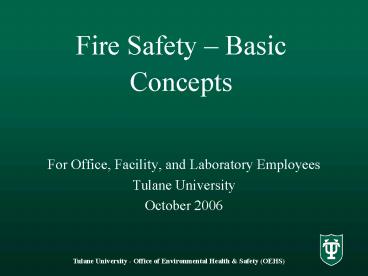Fire Safety Basic Concepts - PowerPoint PPT Presentation
1 / 17
Title:
Fire Safety Basic Concepts
Description:
Other locations check with supervisor ... Fire extinguishers, smoke detectors, sprinklers, fire alarm panels, etc. ... Conditions smoke, flames, heat, toxic gases ... – PowerPoint PPT presentation
Number of Views:1615
Avg rating:3.0/5.0
Title: Fire Safety Basic Concepts
1
Fire Safety Basic Concepts
- For Office, Facility, and Laboratory Employees
- Tulane University
- October 2006
2
Objectives
- To identify emergency and non-emergency telephone
numbers for campus resources - To present the fire triangle and products of
combustion - To present fire prevention and preparation
concepts - To review fire response, evacuation, use and
types of fire extinguishers
3
Campus Resources
- Office of Environmental Health Safety (OEHS)
- Uptown 865-5307 Downtown and all other
locations 988-5486 - Public Safety
- Uptown Campus - Emergency 865-5200 or 5200 (on
campus) - Non-Emergency 865-5381
- TUHSC Emergency 988-5555 or 55555 (on campus)
- Non-Emergency 988-5531
- TNPRC Emergency 871-6411 or 6411 (on campus)
- Non-Emergency 871-6628
- All others dial 911
4
Campus Resources
- Maintenance issues notify Facilities Services
- Uptown Campus Emergency 865-5445
- Non-emergency submit via http//servicewave.tul
ane.edu include name, room location, specific
issue - Downtown Campus - 988-5424
- TNPRC 871-6414
- Other locations check with supervisor
5
- Oxygen, heat/ignition source, fuel must be
present for fire to occur. - Fuels can be in form of solid, liquid or gas.
- Ignition sources ex., smoking materials,
candles, appliances
6
Products of Combustion
- Heat
- Flame
- Smoke
- Toxic gases
7
Before Its A Fire(Fire Prevention)
- Fire Safety Guidelines
- Do not use unapproved appliances.
- Candles, incense, etc. are prohibited.
- Refrain from tampering with or attaching items to
fire safety equipment, ex. Fire extinguishers,
smoke detectors, sprinklers, fire alarm panels,
etc. - Evacuate the building when the fire alarm sounds
- When preparing food, do not leave microwave,
stove, or oven unattended.
8
Before Its A Fire(Fire Prevention)
- Report/address unsafe conditions.
- Exit signs not illuminated, missing or damaged
- Hallway or room doors poor repair, not latching
or self-closing properly - Stairwells doors blocked open or not latching,
storage - Corridors trip hazards, obstructions, storage
- Fire alarm pull stations, horns or strobes
blocked
9
Before Its A Fire(Preparation)
- Know actions to take.
- Know exit locations (at least two ways out).
- Learn to use/locate fire extinguishers.
10
Before Its A Fire(Preparation)
- Emergency Action Plan
- Assists in conducting safe/effective evacuations
- Developed/being developed for each building
- Designates an assembly location for each
building. - Staff training
11
Fire Response
- If you discover the fire, follow the acronym
ESCAPE. - Evaluate the situation.
- Secure the Area - Remove occupants from the
immediate area. - Close the room doors to contain the fire or
smoke. - Activate the fire alarm using manual pull
station. - Phone public safety
- Uptown campus - 865-5200 (ext 5200), Downtown
campus - 988-5555 (ext 55555), TNPRC 871-6411
(ext 6411), Other locations dial 911 - Extinguish the fire using a portable fire
extinguisher, as appropriate.
12
Portable Fire Extinguishers
- To use them, remember PASS
- Pull the pin
- Aim the nozzle at the base
- of the fire
- Squeeze the handle, and
- Sweep the fire from side to
- side
13
Fire extinguisher classifications correspond to
the classes of fire that can be extinguished by
that extinguisher.A ordinary combustibles B
flammable liquids C energized electrical
equipment D combustible metals K Cooking
oils fats
14
Fire Response
- When you hear the fire alarm.
- DSRs and/or Supervisors
- Advise occupants in your department to evacuate.
Ask them to close and lock their office doors and
take belongings, if possible. - Assist Special Needs persons in your department
- Evacuate building using the nearest stairwell or
ground floor exit - Account for all persons make sure that everyone
is out of the building
15
Fire Response
- When you hear the fire alarm.
- DSRs and/or Supervisors (continued)
- Report to TU Public Safety or Police
- Location of fire/alarm activation
- Conditions smoke, flames, heat, toxic gases
- Evacuation status occupants Special Needs
persons - Assemble at the designated location
- Do not re-enter until All Clear is issued by TU
Public Safety or Police.
16
Fire Response
- When you hear the fire alarm.
- Occupants - Evacuate immediately.
- Use the nearest stairwell or ground floor exit.
- Assemble at the designated location.
- Once out, stay out.
- Do not re-enter until All Clear is issued by
TUDPS or TUHSC Police.
17
Tulane UniversityOffice of Environmental Health
Safety (OEHS)www.som.tulane.edu/oehsUptown
Karen Douglas, OEHS, 865-5307, kdougla1_at_tulane.edu
Downtown Susan Welch, OEHS, 988-3996,
swelch_at_tulane.edu
If unable to proceed to quiz, type the link below
into your browserhttp//aurora.tcs.tulane.edu/ehs
/enterssn.cfm?testnum3
Proceed to Quiz































